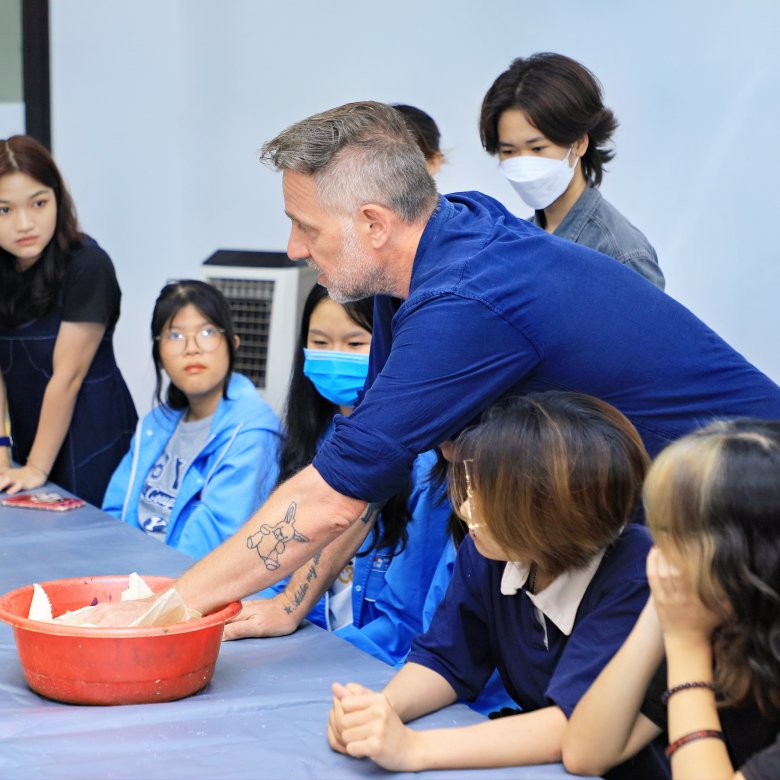Revolutionising fashion education: Meet Sustainable Fashion student Mitchell Vassie
27 November 2023

Mitchell Vassie is a fashion designer, creative director, fashion lecturer and student on Falmouth’s online master’s in Sustainable Fashion. Currently based in Vietnam and with over 20 years of experience working across the fashion industry, Mitchell is Fashion Programme Leader at London College for Design and Fashion in Hanoi. Here he talks about his love of fashion, his commitment to teaching and why he thinks uncomfortable change is necessary within the fashion industry.
What makes you passionate about fashion?
I love fashion: I love the many forms it takes and how it can make people feel; how it can be both protective and meaningful; how it makes people feel either part of a group or outspoken as an individual; how it can be nostalgic and provocative.
Fashion means different things to different people, and we all have a connection to clothes: a well-cut suit, an elegant dress, fresh and loud streetwear, an old and well-worn leather jacket with articulated sleeves due to years of wear, an old favourite pair of jeans showing the scars of the wearer’s day to day life. Yet I have the privilege of choice and it’s important to note that for some, it’s not about choice, but about necessity at the most basic level.
I have an affinity for the principles of slow fashion, where quality and timelessness take precedence over fleeting trends. The world of denim, with its deep history and the craft of indigo dyeing, holds a special place in my heart, and has been a focus of mine for the past decade. However, it's not just the material and product that captivate me. It's the relationships we forge with our garments and the stories they carry. I wrote a denim design course while in the US where I covered the dark history of cotton and indigo, as well as the incredibly negative impact the industry has had on the environment and the people who work in it.
Fashion is a canvas for individuality and can be an avenue for positive change, and this fusion of style and sustainability fuels my passion
On a positive note, we also celebrated the universal aspect of denim, from the civil rights movement to a universal garment that everyone can wear, regardless of socio-economic background, faith, geography and gender. So, returning to the original question, I’m passionate about how fashion can be a melting pot of cultures and ideas and can communicate a message. Fashion is a canvas for individuality and can be an avenue for positive change, and this fusion of style and sustainability fuels my passion.
Having worked across fashion design and academia, as well as running your own company, when did you first become interested in sustainability within the fashion industry?
I have always had a niggling feeling that the amount we produce and consume isn’t right, and that the current exploitative way of production needs to change. It’s not all bad, but ultimately, many of the current systems do not work for people and planet – only for profit.
I’m not proud to admit it, but I have been part of the current system, having worked for high street fast fashion companies. I have travelled all over the planet – mostly the global south – and have witnessed first-hand the negative effects of the current fashion system. I am also acutely aware how it could come across as elitist if I comment on how other people should live their lives. If I comment on a 14-year-old boy working on a production line, do I have the right to get involved? In simplistic terms, I would instinctively say that this is wrong. However, what is his situation? How many family members is his work supporting? In his community and religious beliefs, is this considered normal?
The phrase, ‘walking a mile in someone else’s shoes’ springs to mind. I find it supremely arrogant to judge in that way. If anything, I feel the need to address this at a more systemic level, driven by the Global North’s need for more and more product for less and less cost. To me it is unacceptable to place factories under enormous pressure and wring out every last cent from a supplier to support the current economic growth paradigm. It’s not easy balancing ethical values with profit-oriented practices, and this sparked my commitment to exploring sustainable fashion. This intersection –where ethical choices meet commercial challenges – became more and more apparent while working for commercial companies.
What made you decide to take on the online master’s in Sustainable Fashion at Falmouth?
Sustainability is a subject I bring to my classes every day in some way, and I wanted to become more informed and to be more authentic with the information I am sharing with students on this ever-evolving subject.
We need to break away from the expected and dated ways of delivering knowledge to our students
Around five years ago, I had an epiphany. I asked myself: do we want to create young designers who are prepared and ready for the industry that exists today? Or do we want to encourage radical thinkers and changemakers to create a brighter and more ethical fashion industry future? I felt and still feel we need to ‘revolutionise’ fashion education, and as educators we need to show the courage of our convictions, or we will continue to be part of a greater problem of perpetuating an unsustainable industry in its current guise.
Revolutionise or evolutionise? Where do we start? In my opinion, uncomfortable change is necessary. We need to break away from the expected and dated ways of delivering knowledge to our students. Even five years ago, I suggested that incremental change was no longer enough, that outsourcing this responsibility wouldn’t work and that we had to make a change. Taking this online Sustainable Fashion MA at Falmouth have galvanised these ideas and given me the tools to discuss the subject in different ways.
What is the most valuable thing you have taken from the course so far?
Apart from the in-depth information shared on the course, to me the most obvious answer is the passionate community of like-minded individuals. There is a brilliant phrase in Japanese that sums this up: itai doshin, meaning many in body, one in mind, or many individuals with one goal. I love this sentiment and virtually meeting and listening to my class members has been the most valuable thing.
How do you find studying online?
The online learning environment has been a revelation to me. I am based in Vietnam, which provides me with amazing content and case studies to investigate from a Global South perspective. And I’m finding the course content unbelievably refreshing; being able to navigate the content and manage the workload around my full-time work was a concern, but now well into my second module I am finding my flow. At the age of 52 and having been out of academia for over thirty years was a real worry to me at first. But with some planning and commitment, so far, I’m finding the juggling act between teaching and learning easier than expected.




